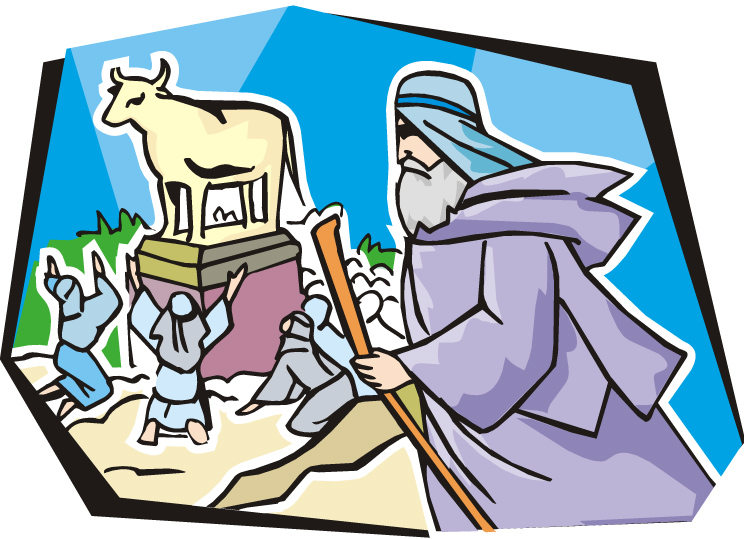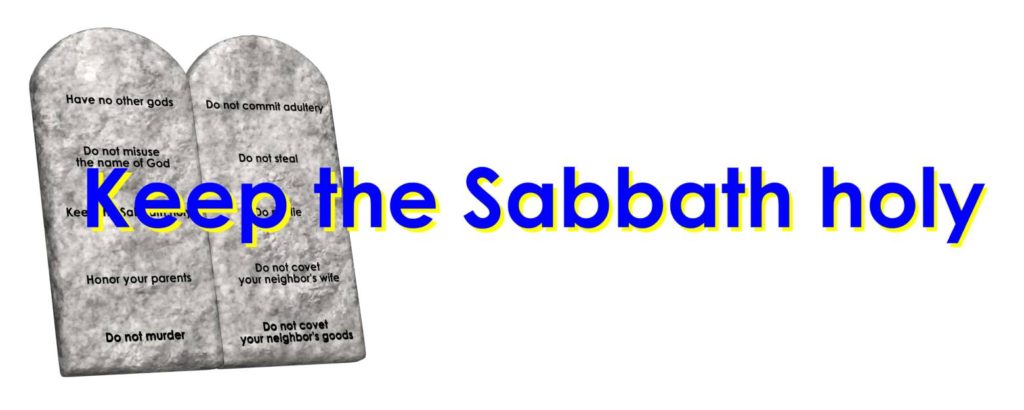
Exodus 32:1, Moses delayed coming. Moses is a prophetic picture of Yeshua. Moses’ descending from Mount Sinai is a prophetic picture of Yeshua descending from heaven to the earth the first and second time. When the people presumed that Moses delayed his coming, they fell to the temptation to syncretize with the heathen religious system around them by yielding to their baser nature giving in to the lusts of their flesh as expressed in golden calf worship. Heathen, man-made religious systems have lower moral and spiritual standards than those of YHVH. In many respects, the mainstream church has done the same thing as the ancient Israelites by acting as if Yeshua has delayed his second coming, and by conforming to some of the world’s standards and customs. This is a form of golden calf worship, which is a mixture of Torah-truth and pagan practices. Yeshua warned his disciples against this proclivity of humans to grow impatient and spiritually cold wile waiting for his return (Matt 24:48).
Exodus 32:2, Break off the golden earrings.The Christian people have generously given the mainstream church much gold and other wealth over the past 1900 years. In the mean time, with that wealth, the church system has constructed many huge religious monuments. These are monuments, in part, to the gods of materialism, and is a form of golden calf worship. Neither Yeshua nor his disciples needed vast sums of money, resources or monuments to spread the gospel message. What they lacked in material resources they made up with passion for the gospel message and with the anointing of YHVH to proclaim that gospel with miraculous power. What the mainstream church largely lacks in passion and the anointing to spread the gospel, they now, sadly, substituted with wealth and religious monuments.
On Shavuot (the Feast of Weeks or Pentecost), at Mount Sinai, YHVH entered into a marriage covenant with the children of Israel, but they were not ready to live up to the terms of that covenant. Those terms, simply stated, involved the Israelites being faithful and obedient only to YHVH, Israel’s Elohim (God) and spiritual husband, and to follow his instruction in righteousness, the Torah. This Israel quickly demonstrated they were not willing to do, for they had hardly said “I do” to their marriage vows (Exod 24:3, 7) when they turned their hearts away from YHVH and began worshipping the golden calf—a pagan deity from Egypt. After the golden calf incident and up until Yom Teruah (the Day of Trumpets or Shofar Blasts) when Moses received the second tablets of stone from YHVH containing the Ten Commandments, the children of Israel, the bride of YHVH, prepared herself not only to receive YHVH’s instructions again, but this time to be faithful to her marriage vows. This Israel did. She remained faithful to YHVH for approximately 38 years while trekking through the wilderness of Sinai, after which she entered the Promised Land and “stayed the course” until after the death of Joshua. What can we as Bible believers learn from ancient Israel that applies to us today?
Sadly, the cycles of history often repeat themselves. This time, it involved the spiritual descendants of the children of Israel who were at Mount Sinai. In the early first century A.D., the redeemed Israelite followers of Yeshua received the Torah written on the fleshly tablets of their hearts by the finger of the Spirit of Elohim on the Day of Pentecost (Shavuot) as recorded in Acts 2. But starting in about A.D. 70 with the destruction of the temple in Jerusalem and continuing up through the Second Jewish Revolt of a.d. 135 until the time of Emperor Constantine (in the fourth century), the first-century spiritual bride of Messiah had, to a large extent, abandoned YHVH’s Torah-commandments and turned, to one degree or another, to a mixed form of worship (of which ancient Israel’s worship at the golden calif was a prophetic foreshadow) where some pagan practices were assimilated into the early churches’ belief system (most notably, Sunday replaced the Sabbath, and Christmas, Easter and other paganistic holidays replaced the biblical feasts).
Moses’ descent of Mount Sinai on Yom Teruah with the second set of tablets containing the Torah prophetically foreshadows Yeshua’s second coming. As Moses renewed YHVH’s covenant with the repentant Israelites after the golden calf incident and the Israelites remained faithful for a long time afterwards, even so, Yeshua, at his second coming, will establish a renewed covenant with his faithful end time saints who have come out of golden calf-type religious systems.
In our day, YHVH is calling out a remnant of people from the church who are leaving behind the pagan traditions of golden calf worship and who are returning to the ancient blessed paths of YHVH’s Torah-instructions in righteousness. The book of Revelation speaks of a group of end-time saints who will say “I do” to YHVH (Rev 14:4), and whose identifying mark is their faith in Yeshua the Messiah (i.e. the gospel message) and yet who faithfully keep YHVH’s Torah-commandments (Rev 12:17 and 14:12).
When Yeshua returns on or near Yom Teruah at the end of this age, he will be ready to marry a bride that is without spot and wrinkle and who has come out of the end-times Babylonian religious whore system (Rev 18:4). This bride who will be wearing the robes of righteousness of Torah-obedience (Rev 12:17; 14:12; 19:7–9) will be ready to enter into a new covenantal agreement—a wedding contract or ketubah—with Yeshua (Heb 8:7–13), the Bridegroom, ever to remain faithful to him and never again to return to Baal or golden calf worship. He will lead his wife into the Messianic Age or Millennium, even as Joshua, a prophetic foreshadow of Yeshua, led the younger generation of wilderness Israelites into the Promised Land.
Golden Calf Worship Among YHVH’s People Today
Let’s look at the series of events that occurred as the children of Israel were leaving Egypt, which have major relevance to what is occurring in mainstream Christianity in our day. If we fail to learn the lessons of history, we’ll likely repeat the mistakes of history. It has to do with golden calf worship.
- YHVH redeemed the children of Israel out of Egypt and set the slaves free. He blessed them not only by giving them their freedom, but by giving them the wealth (gold and silver) of Egypt as well. We read that the Israelites exited of Egypt with a high hand. They were victorious, free and wealthy.
- YHVH led them into the wilderness en route to the Promised Land—normally an eleven day journey. They had some difficulties: Pharaoh tried to kill them at the Red Sea, they lacked clean drinking water, and they had food issues, but YHVH provided them deliverance from Pharaoh, gave them clean water, manna and meat, and they overcame these trials.
- Next, YHVH led the Israelites to the foot of Mount Sinai, and on Shavuot he made a covenantal agreement with them and gave them his Torah as their national constitution. They agreed to obey him and to keep his commandments. He promised to bless them if they remained faithful to him.
- Moses went up to Mount Sinai to receive the Torah-covenant on two tablets of stone. While he was gone for 40 days, the people grew worried and anxious and become weary of waiting for Moses to return. This was a test they had to pass of their faithfulness. Would they be faithful to YHVH and keep his commandments, or would they stray spiritually from the path of righteousness YHVH had given them and they had agreed to follow?
- The Israelites got tired of waiting, and took the gold from Egypt and turned it into a golden calf, and then they rose up to play (to party). They even called their revelry a feast to YHVH! They used religious verbiage like “YHVH” and “feast” to add legitimacy to their illegitimate activities, but this didn’t change the sin of their behavior. Sin is still sin regardless of how we attempt to cloak it in spiritual terms and costumes in an attempt to justify our wicked behavior.
- Moses then came down from Sinai with the stone tablets, saw the people worshipping the golden calf and the people playing, and he brought judgment against those who were unfaithful to YHVH and rewarded those who had been faithful to him.
Let’s now analyze this story to see what spiritual lessons we can glean from it.
YHVH blessed the children of Israel by setting them free from Egypt, giving them honor as freedmen, taking them to himself to be his own special people, giving them a religion, a legal code and much material wealth. What was the first job assignment YHVH gave his people to do? It was to build a tabernacle so that YHVH might dwell in their midst.
YHVH gave the Israelites wealth from Egypt not only as a remuneration for their years of slavery in that nation (Torah teaches that a workman is worthy of his hire), but he gave them wealth so they could build him a home. Instead, what was the first thing the Israelites did with their wealth? They built a golden calf in honor of their past life in Egypt.
The golden calf represented the spiritual idols or strongholds of sin that were already in their hearts, and which they failed to leave behind in Egypt. Though the Israelites had physically come out of the idolatry of Egypt, they hadn’t gotten Egypt’s idols out of their own hearts. When the way of the wilderness became too tough and their faith was tested (i.e. would they remain faithful to YHVH in the time of trial and delayed expectations?), instead of trusting YHVH, they grew weary and defaulted to following the idols in their hearts. What were these idols or false gods? They were wealth, materialism and pleasure and entertainment. In Matthew 6:33, Yeshua told his disciples to seek first the kingdom of Elohim and his righteousness and all these things (i.e. physical blessings) will be added to you and the cares of this life will take care of themselves. Instead of seeking the first YHVH’s kingdom and righteousness, the Israelites took the wealth YHVH had given them to be used to build him a tabernacle, and they got tired of waiting for Moses to come down form the mountain, and they built a golden calf in honor of their true heart’s desires and then they rose up to play. They didn’t abandon their faith entirely. They didn’t totally turn their back on YHVH. They simply built a calf supposedly in honor of YHVH. Total abandonment of YHVH’s Torah would have been too blatant a sin. Instead, they kept the parts of YHVHism that were appealing to them and blended it with the idols of their heart that they had brought with them from Egypt. This was spiritual adultery (i.e. worsipping other gods besides YHVH). This is what Yeshua decried as serving YHVH and mammon, which is idolatry.
What can we learn from this sad story? Are we any different than the Israelites? How does it apply to us? Recall the words of Paul in 1 Corinthians 10:11. Speaking of the children of Israel, he wrote,
Now all these things happened to them as examples, and they were written for our admonition, upon whom the ends of the ages have come.
We can easily see the splinter of sin in the eyes of the ancient Israelites, but can we see the beam of sin in our own eyes? Can we not see that often we’re guilty of the same sin as the children of Israel? We are guilty of attempting to serve both Elohim and mammon.
Consider this. At the time of our initial salvation or conversion, YHVH saved us out of our own personal Egypt. He showed us much mercy and grace by delivering us from captivity to the world, the flesh and devil. He proved his love to us by showering us with blessings in hopes that we would remain faithful to us. However, our faithfulness to him has to be tested. Will we remain faithful to him through the trials of the wilderness of life en route to the Promised Land of YHVH’s eternal kingdom? While we’re waiting for the second or greater Moses, Yeshua the Messiah, to come down from the spiritual Mount Sinai of heaven to finalize his marriage covenant with us at his second coming, are we getting weary of waiting? Remember Peter’s words of exhortation to us all in this regard:
Beloved, I now write to you this second epistle (in both of which I stir up your pure minds by way of reminder), that you may be mindful of the words which were spoken before by the holy prophets, and of the commandment of us, the apostles of the Master and Savior, knowing this first: that scoffers will come in the last days, walking according to their own lusts, and saying, “Where is the promise of His coming? For since the fathers fell asleep, all things continue as they were from the beginning of creation.” For this they willfully forget: that by the word of Elohim the heavens were of old, and the earth standing out of water and in the water, by which the world that then existed perished, being flooded with water. But the heavens and the earth which are now preserved by the same word, are reserved for fire until the day of judgment and perdition of ungodly men. But, beloved, do not forget this one thing, that with YHVH one day is as a thousand years, and a thousand years as one day. YHVH is not slack concerning His promise, as some count slackness, but is longsuffering toward us, not willing that any should perish but that all should come to repentance. But the day of YHVH will come as a thief in the night, in which the heavens will pass away with a great noise, and the elements will melt with fervent heat; both the earth and the works that are in it will be burned up. Therefore, since all these things will be dissolved, what manner of persons ought you to be in holy conduct and godliness, looking for and hastening the coming of the day of Elohim, because of which the heavens will be dissolved, being on fire, and the elements will melt with fervent heat? Nevertheless we, according to His promise, look for new heavens and a new earth in which righteousness dwells. Therefore, beloved, looking forward to these things, be diligent to be found by Him in peace, without spot and blameless; and consider that the longsuffering of our YHVH is salvation… (2 Pet 3:1–15)
Sadly, many of us have become weary of waiting for the promise of Yeshua’s coming. We haven’t turned our back totally on Yeshua and his Torah, but we have turned back to some of the ways of Egypt. The idols that have been laying hidden in our hearts and which we have been secretly worshipping all along are rising to the surface, and we’re beginning to make golden calf monuments to them. These are our real masters — our real gods, for, in reality, they take precedence over obedience to and faith in YHVH. We may give lip service to Elohim, but he’s not the only Master of our lives! We reason within ourselves, “I’ve been waiting for YHVH-Yeshua for a long time now. I have struggled to be faithful to him. While others around me are enjoying the good life, I’ve been sacrificing by not giving in to seeking my own pleasures. I’m getting tired of waiting, so now I’m going to enjoy this physical life a little more than I have been. YHVH won’t mind if I enjoy the mammon and the pleasures of this life and put off just a little seeking first his kingdom and righteousness.” And so we justify ourselves in our sin of idolatry (golden calf worship) as we move seeking YHVH with all of our hearts to the back burner of our lives.
This was the problem with the five foolish virgins of Matthew 25. They didn’t prepare themselves for Yeshua’s coming. They came to believe that Yeshua was delaying his coming, so they went out to play and to have a good time while waiting (Matt 24:48). To that servant, Yeshua promised to come in a day when he wasn’t expecting and to punish him accordingly along with the rest of the wicked. He called that servant a hypocrite — one who knows better, but does the wrong thing anyway (Matt 24:49). The same is true of the five foolish virgins. The result of their actions was that they weren’t permitted entrance into the wedding supper of the Lamb. They sold their spiritual birthright, like Esau, for a bowl of lentils, so they could enjoy the pleasures of sin for a season, and they lost out on the biggest blessing of all when they forsook YHVH for mammon!
The children of Israel made the golden calf while waiting for Moses to come down from Mount Sinai with the stone tablets the first time. Moses broke the tablets when he saw the golden calf because the Israelites had broken their covenant with YHVH. YHVH forgave the people of their idolatry, and invited Moses to go back up to Mount Sinai the second time to get another set of stone tablets. Moses came back down on Yom Teruah, and YHVH graciously renewed his covenant with the people.
Similarly, in our day, YHVH’s people (i.e. the Christian church) have broken their covenants with YHVH and turned to golden calf worship involving mixing heathen practices with the truth of the Bible. We accepted Yeshua at the time of our initial salvation or conversion, and we agreed to make him the Master of our lives. For most of us, Yeshua really isn’t our Master.
This isn’t just true of the mainstream Christian church, but of most of YHVH’s people who have supposedly come back to the Torah and are part of the so-called the Hebrew Roots Movement. How is this? Many of them are mixing Sabbath and feast day observance with the religion of Egypt, while still calling it “a feast to YHVH.” They’re not observing his divine appointments wholeheartedly as YHVH commands because their job, education or other secular activities are more important to them. This is golden calf worship! It’s worshipping money, pleasure and entertainment more than Elohim. How is that this is any different than the children of Israel worshipping the golden calf and calling it a feast to YHVH? What was YHVH’s view of this? He wanted to destroy them, for their loyalty to the idols of Egypt, which in reality, had taken precedence over obedience to him. Only the intercessions of Moses on behalf of the sinful and spiritually adulterous Israelites spared them from YHVH’s annihilation.
Additionally, the modern church including those in the Hebrew Roots Movement are largely sold out to mammon, money and entertainment. How many pastors, Bible teachers and ministers do you know who don’t get paid for what they do, or if so, very little? Instead they largely support themselves from secular work? In other words, they serve YHVH voluntarily with little or no remuneration? Have I proved my point? Many have become spiritual peddlers and are in it for the money. They would deny this, but their actions speak louder than their words. They’re hirelings!
As Moses came down from Mount Sinai on Yom Teruah to renew the covenant with YHVH, so Yeshua will return for his bride on Yom Teruah in the last days to begin the process of finalizing his marriage covenant with her. Will she be ready for him? Are we the foolish bride like the lukewarm Laodiceans who were too busy pursuing mammon, money and pleasure (Rev 3:14–21), or will we be the wise bride of Yeshua’s parable who had her lamp ready and was seeking first the kingdom of Elohim and his righteousness? This is what the lamp filled with oil represents spiritually. The Laodiceans thought they were pretty well off spiritually because they were wealthy physically, yet Yeshua viewed them as spiritually destitute and miserable. This was their true spiritual state. This fairly describes many if not most of us in the western church.
The American and western church is in a Laodicean state spiritually. So is the Messianic or Hebrew Roots Movement. For too many people, their religious expression is largely superficial. We have the trappings of biblical obedience, but the false gods and idols of our heart are just below the surface waiting to emerge when the going gets tough. These idols have been there all along, for we never rid our lives of them from our Egyptian past. During the wilderness journey of our life and our faith is tested and we start to get weary, we’ll default to theses idols of mammon, wealth, and pleasure instead of seeking first the kingdom of Elohim?
To find out where we stand spiritually in this regard, where our true spiritual allegiance is, we must ask ourself some hard questions. For example, do I honor YHVH first with my time, talent and treasure? Do I put my job and schooling first over obedience to YHVH’s weekly Sabbath and annual sabbaths — the biblical feasts? Do I honor YHVH diligently by giving him the first fruits of my financial increase? Or am I still letting loyalty to Pharaoh (Satan) and Egypt (this world and money) and my own pleasure and entertainment (the self) dictate how and to what degree I will go all the way in serving YHVH?
It’s not easy serving YHVH wholeheartedly and completely while in exile in Babylon. The tentacles of the Babylon the Great New World Order system have wrapped themselves around all aspects of our lives and our thinking. Coming out of Babylon and getting ready for Yeshua the Messiah, our heavenly Bridegroom’s return involves making hard choices. Who do we love more? Babylon or Yeshua?
Because money, pleasure and materialism are the number one American gods, YHVH will bring judgment against them. Our economic system is going to collapse, along with that of the world at some time in the near future. There will be an economic reset that will occur that will put most of us in physical poverty. This is when the Babylon the Great New World Order mark of the beast system will be unveiled and initiated. We will have to depend either on YHVH to provide for us, or on a mark of the beast in order to buy and sell. What will we choose? If we’re not putting YHVH first NOW in all areas of our lives and seeking first his kingdom and righteousness, no matter what our excuses and self-justifications are or how much we’re deluding ourselves into believing otherwise, we will not pass the test. This is golden calf worship! Will we serve YHVH or mammon (Babylon the Great, New World Order)? That is the question we must ask ourselves.
What does YHVH require of his people? Two Scriptures sum it up.
And now, Israel, what does YHVH your Elohim require of you, but to fear YHVH your Elohim, to walk in all His ways and to love Him, to serve YHVH your Elohim with all your heart and with all your soul, and to keep the commandments of YHVH and His statutes which I command you today for your good. (Deut 10:12–13)
But on this one will I look: On him who is poor and of a contrite spirit, and who trembles at My word. (Isa 66:2)
Is Yeshua really our Master in all areas of our life, or just in the areas that we’ve submitted to him, with all the other areas relegated to golden calf worship?
What I’m teaching here is the voice of one crying in the wilderness — the voice of John the Baptist to prepare the way for Yeshua.
In those days came John the Baptist, preaching in the wilderness of Judaea, and saying, “Repent ye: for the kingdom of heaven is at hand. For this is he that was spoken of by the prophet Isaiah, saying, ‘The voice of one crying in the wilderness, prepare ye the way of YHVH, make his paths straight.’” (Matt 3:1–3)
Summary and Conclusion
The Israelites were saved by the strong arm of YHVH and the blood of the lamb on the door posts of their homes. They then left Egypt, and were given YHVH’s instructions in righteousness at Mount Sinai concerning how to live a set-apart life. Yet when the going got rough they reverted to the pagan practices and gods of Egypt all the while deceiving themselves into believing they were worshiping YHVH (Exod 32:3–8):
Then all the people tore off the gold rings which were in their ears and brought them to Aaron. He took this from their hand, and fashioned it with a graving tool and made it into a molten calf; and they said, “This is your god, O Israel, who brought you up from the land of Egypt.” Now when Aaron saw this, he built an altar before it; and Aaron made a proclamation and said, “Tomorrow shall be a feast to YHVH.” So the next day they rose early and offered burnt offerings, and brought peace offerings; and the people sat down to eat and to drink, and rose up to play. Then YHVH spoke to Moses, “Go down at once, for your people, whom you brought up from the land of Egypt, have corrupted themselves. They have quickly turned aside from the way which I commanded them. They have made for themselves a molten calf, and have worshiped it and have sacrificed to it and said, ‘This is your god, O Israel, who brought you up from the land of Egypt!’”
History repeated itself at the time of Jeroboam and again in the first-century A.D.—the early church era. On the Day of Pentecost Israel was again given the Torah (written on their hearts by the Spirit or Ruach of Elohim), yet when persecution arose at the end of the first-century A.D., the early church went into apostasy forsaking the weekly Sabbath and annual Sabbaths (the biblical feasts), the kosher laws, and many other aspects of the Torah, and they accepted pagan practices (Christmas, Easter, Sunday, and so on), which they melded with the truth of the Scriptures—the Word of Elohim.
How does “golden calf worship” reflect in the mainstream church culture of our day? In what way does the mainstream church worship idols and end up breaking YHVH’s commandments? Why are so many Christians beginning to recognize that “our [spiritual] fathers have inherited lies” (Jer 16:19), and that they have followed “traditions of men by which the Word of Elohim has been made of none effect” (Matt 15:6 and Mark 7:7, 9)?
Is the Father now beginning to call a people out of religious Babylon (confusion or mixture, see Rev 18:4), and preparing a set-apart people to be the bride of Yeshua, who will be without spot and blemish, and will be adorned in the robes of Torah-righteousness through the power of the resurrected Yeshua (Rev 12:17; 14:12; 19:7–8)?






